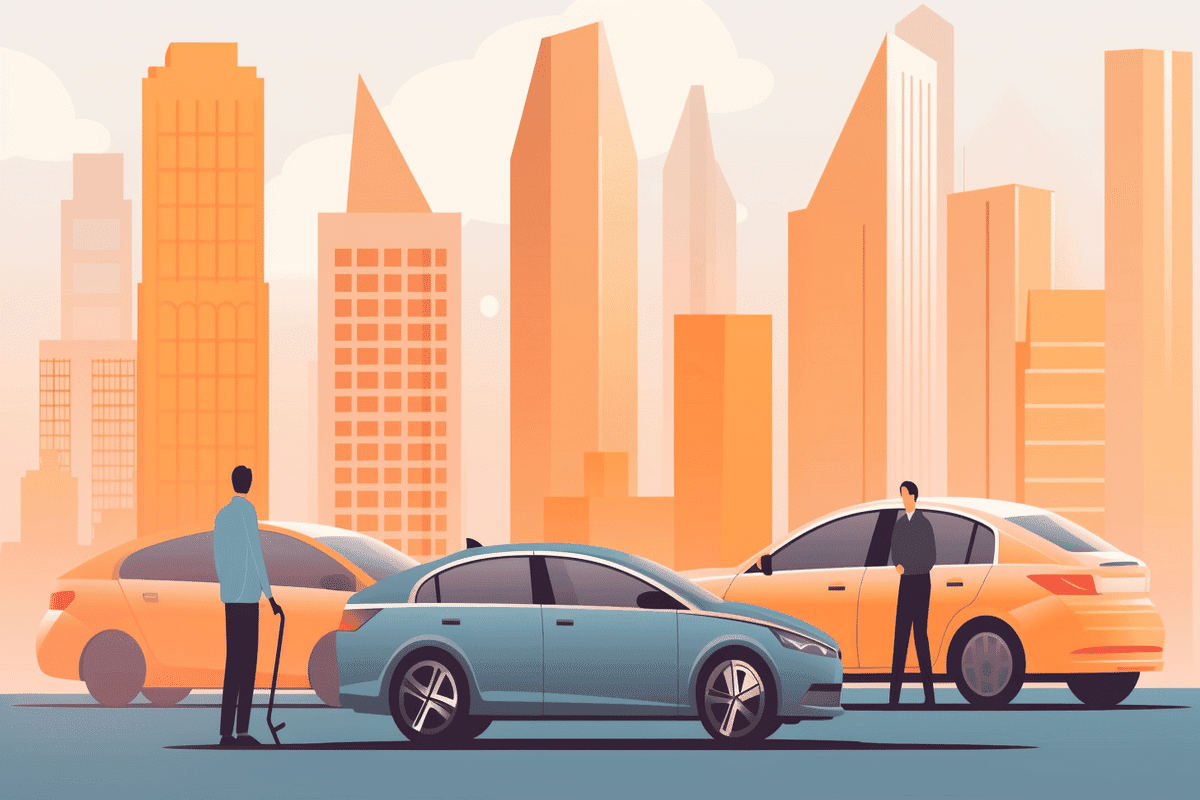Who needs non-owner car insurance in Ontario, and why?
By Daniel Schoester | Published on 16 May 2023


Non-owner car insurance is a type of coverage that protects you if you’re driving a car you don’t own. For example, you may frequently borrow a friend’s car or use rental vehicles. Having non-owner car insurance can protect you from paying significant expenses out of pocket if you cause an at-fault accident. However, car insurance isn’t necessary if you rarely drive these vehicles.
You can add this type of insurance to your existing auto policy in Ontario. That means you can’t purchase non-owner car insurance as a standalone policy in the province. The add-on generally costs $200-$500 annually and can be purchased as an endorsement through Form OPCF27. You’ll be covered for personal injury protection, underinsured/ uninsured driver coverage, and more when driving another vehicle. This guide will walk you through everything you need about non-owner car insurance in Ontario.
Advantages and Disadvantages of Non-Owner Car Insurance
| Advantages | Disadvantages |
|---|---|
| – Extends your existing policy – Saves rental car fees | – Must be added to an existing policy – Doesn’t apply within your household |
Advantages
- Extends your existing policy: Non-owner car insurance extends your current policy to cars that aren’t yours. This means you’ll have the protection of your insurance when driving a friend’s car.
- Saves rental car fees: Many rental car companies may waive their loss damage fees if you have non-owner insurance. This can save you a lot of money on rental costs.
Disadvantages
- Must be added to an existing policy: In Ontario, you cant purchase non-owner insurance as a standalone policy. You must have a current Ontario car insurance policy and include this as an additional feature.
- Doesn’t apply within your household: Insurance companies require your name listed as a named driver for any vehicle within your home. This means there is no benefit to receiving non-owner insurance to drive your partner’s car.
Who Needs Non-Owner Car Insurance?
Non-owner car insurance is ideal for those who borrow or rent cars frequently and want protection in an at-fault accident. It commonly provides coverage against bodily injury and underinsured drivers. However, you can purchase additional enhancements that will increase your covered events. It’s helpful if you rent cars frequently, borrow a friend’s car often, or use car-sharing services. The remainder of this section will walk you through the three types of people who should consider non-owner insurance.
a) Drivers Who Rent Cars Frequently
Aside from insurance protection, drivers who frequently rent cars can save significant amounts of money. This is because many rental companies have additional insurance costs that are generally expensive. Having non-owner insurance enables you to decline these coverages without financial risk. However, this coverage is also typically included with travel credit card insurance.
b) Drivers Who Borrow Cars
If you frequently borrow a car from friends or family, non-owner insurance can extend your existing policy coverage and protect you in an accident. One thing to note is that the vehicle you’re borrowing can’t be from your household. This is because many insurance companies require you to become a named driver on any car in your home. As a result, you’ll be considered an owner and non-owner insurance won’t apply.
c) Car Sharers
Non-owner car insurance can provide additional protection if you frequently use car-sharing services. In this case, you technically don’t own the vehicle but are responsible for any at-fault damage if an accident occurs. However, insurance companies will only cover you for the events included in your policy. This means you’ll need to pay for damages if you’re at fault in an accident without collision coverage.
Non-Owner Car Insurance Coverages and Exclusions
Considering many types of car insurance in Ontario, it’s essential to understand how you are protected. Non-owner car insurance may not include as many coverages as you would receive with a standard policy. You’ll have to double-check with your policy to see what’s included. This section will explain in detail what coverages you’ll have.
Coverages
Coverages are the types of events your insurance protects you from. If the event occurs, the policy will protect you up to the coverage amount. However, you’ll have to pay a deductible before receiving insurance benefits. This section will explain the common events covered by non-owner car insurance.
Accident Benefits
This insurance, also called Statutory Accident Benefits Schedule (SABS), pays you and your passengers for healthcare expenses. It offers financial protection to anyone injured or dying in a car accident. Mainly, it covers medical and rehabilitation costs that the insured person’s provincial health plan (OHIP) does not cover.
Uninsured Automobile Coverage
Uninsured automobile coverage protects when the other driver’s insurance policy is insufficient or non-existent. This typically happens in a hit-and-run accident or when the other driver lacks adequate coverage.
Exclusions
Exclusions are the types of events that your non-owner car insurance policy won’t cover. You will be liable for damages if an excluded event occurs. However, always double-check your policy to determine the coverages and exclusions in your policy. This section outlines the standard exclusions found in non-owner policies.
- Comprehensive Coverage: This offers protection against loss or damage due to theft, vandalism, weather, and other non-accident-related events.
- Collision Coverage: This pays for damage to your car if it is in an accident.
- Roadside Assistance: This covers towing costs and labour if your car breaks down.
How Much Does Non-Owner Car Insurance Cost?
On average, non-owner car insurance in Ontario costs between $200 and $500 per year. However, shopping around and comparing quotes from multiple insurance providers is essential to ensure you get the best coverage at the most affordable price. You can receive quotes through an insurance broker, direct company, or online marketplace. When shopping for non-owner car insurance, it is essential to read the policy carefully and ask any questions you may have before making a purchase. Some policies may have limitations or exclusions that could affect your coverage in the event of an accident.
Six Factors that Affect the Cost of Non-Owner Car Insurance
1. Your Deductible
Your deductible is the amount you pay out of pocket before receiving coverage. The amount you choose for your deductible will also affect the cost of your non-owner car insurance. A lower deductible can result in higher premiums, while a higher deductible can reduce the cost of your policy.
2. Your Coverage Limits
The coverage limits you choose for your non-owner car insurance will also affect the cost of your policy. Higher limits can increase the price, while lower limits can reduce it. It is essential to consider how much coverage you need before choosing a limit and to ensure that you are adequately protected in the event of an accident or loss.
3. Your Driving Record
One of the most significant factors affecting the cost of non-owner car insurance is your driving history and record. You may be considered a higher-risk driver with a history of accidents, traffic violations, or other driving infractions. This can result in higher premiums for your non-owner car insurance policy. On the other hand, if you have a clean driving record and no history of accidents or violations, you may be eligible for lower premiums on your non-owner car insurance policy.
4. Your Age and Gender
Another factor influencing the cost of non-owner car insurance is your age and gender. Younger drivers, especially those under 25, are typically considered higher-risk drivers and may be charged higher premiums. Gender can also play a role in determining the cost of non-owner car insurance. Insurance companies generally consider male drivers more risk than female drivers. As a result, men typically have higher premiums.
5. The Type of Vehicle You Are Driving
The type of vehicle you are driving can also affect the cost of non-owner car insurance. Generally, more extensive and expensive vehicles cost more to insure than smaller or less expensive ones. Additionally, cars that are more difficult to find replacement parts for will be more costly to insure.
6. Your Location
Your location can also affect the cost of your non-owner car insurance. Insurance rates are higher in urban areas due to higher accidents, crime and theft rates. You may need to pay higher premiums for your policy if you live in a neighbourhood with high car theft or vandalism rates.
How to Get Non-Owner Car Insurance in Ontario
You’ll need to enhance an existing auto insurance policy to get non-owner car insurance in Ontario. You can’t buy non-owner insurance as an individual policy. Contact your current insurer to purchase non-owner car insurance and ask if they offer coverage. If they do, they will provide you with a quote for the additional coverage. Once you accept the quote and purchase the coverage, your existing policy will include it. You should then receive confirmation of the additional coverage via email or mail.
Form OPCF27 Explained
Form OPCF27 is an endorsement that you must add to your existing Ontario car insurance policy to purchase non-owner car insurance. It extends the coverage from your current policy to the rented or borrowed vehicle and protects you if you are involved in an accident. It is important to note that Form OPCF27 only covers liability insurance, which means it does not cover damages to your vehicle. However, there are some eligibility requirements for this form. In particular, the new car you’ll be driving must weigh 4,500 kg or less. In addition, you can only rent the vehicle for a maximum of 30 days, and it must be operating in Canada or the United States.
What to Consider When Choosing Non-Owner Car Insurance in Ontario
It can be overwhelming to compare car insurance policies. Non-owner insurance is no different. Still, with the correct information and research, you can make an informed decision that meets your needs and budget. There are several factors that you should consider before making a final decision.
Required Coverage
Firstly, you need to determine the coverage you require. There are two ways to think about car insurance; horizontally and vertically. Horizontal is the different types of events you are covered for. Meanwhile, vertical is the amount of coverage you receive for each event.
Policy Cost
Secondly, you need to consider the cost of the policy. While you want the best coverage possible, you must also ensure you can afford the premiums. It is, therefore, essential to compare quotes from different insurance providers to find the most affordable option that meets your needs.
Company Reputation
Thirdly, you need to evaluate the reputation of the insurance provider. You want to work with an insurance company with a good track record of quality coverage and excellent customer service. You can check online reviews and ratings to understand what to expect from different insurance providers.
Customer Service
Customer service quality is another crucial factor to consider. You want to work with an insurance provider that is responsive, helpful, and available to answer your questions and concerns. Testing the customer service quality by contacting the insurance provider’s team before purchasing the policy is advisable.
Claims Process
Finally, you need to consider the ease of filing a claim. Accidents can be stressful, and the last thing you want is to deal with a complicated and time-consuming claims process. Therefore, you should choose an insurance provider with a straightforward and efficient claims process.
The Bottom Line
Non-owner car insurance can give you peace of mind when driving someone else’s vehicle. Before purchasing a policy, comparing quotes from different insurers and evaluating the insurance provider’s reputation is essential. Before making your final decision, consider the cost, liability coverage, customer service quality, and ease of filing a claim. With the right information and research, you can find an affordable non-owner car insurance policy that meets your needs.
